Staying Prepared for Earthquakes
Quick Guide to Earthquake Safety and Preparation
When an earthquake occurs, stay calm and do the following:
- Take shelter under a table.
- Extinguish any flames (stoves, candles, etc) after earthquake tremors have stopped.
- Open doors to make sure you can leave.
- If a fire has spread, quickly extinguish it.
- Be careful of broken glass inside your home.
- Do not run outside in a panic.
- Stay away from front gates and walls.
- Check on your neighbors.
- Work together to help people.
- Get accurate information from television or radio.
Stay prepared beforehand by doing the following:
- Secure your furniture so that it does not fall over.
- Do not place anything near your stovetop that burns easily.
- Discuss with your family or others that you are close with both where you will evacuate to and how you will contact each other (such as 171 Disaster Emergency Dial).
- Have things ready to take in case of an emergency, such as food, water, regular medicine, and valuables. Be sure to have essential supplied for at least three days (one week, if possible).
- Be aware of any features of the area where you live that might affect you in a disaster.
- Check where evacuation areas are and how to get to them.
- Actively participate in emergency drills run by volunteer disaster preparedness organizations.
Learn more about earthquakes
We cannot say when, where, or under what circumstances an earthquake will occur. It is important to know about and prepare for earthquakes to keep yourself and your family safe.
What is an earthquake?
Types of earthquakes
There are two types of earthquakes: dislocation (epicentral) earthquakes and trench earthquakes. Trench earthquakes occur on the seafloor, which can trigger tsunamis. Refer to the link below to learn more about tsunamis.

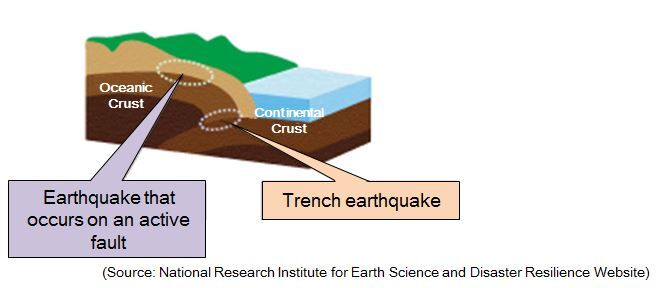
The difference between magnitude and seismic intensity
Magnitude refers to the amount of energy released during an earthquake (the size of the earthquake), while seismic intensity indicates the size of tremors that happen at a specific location.
The epicenter and seismic intensity

Seismic intensity scale
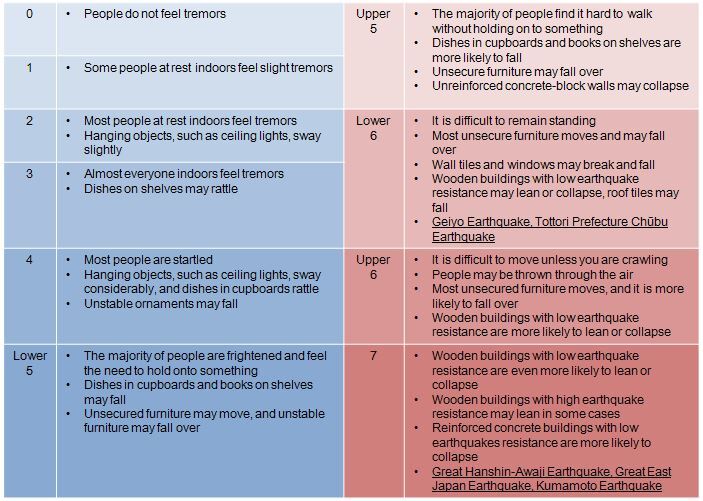
(Source: JMA Seismic Intensity Scale Explanation Table)
What are Earthquake Early Warnings?
Earthquake Early Warnings are announced by the Japan Meterological Agency via TV, radio, mobile phones, and other channels when an earthquake with a maximum seismic intensity of lower 5 or greater is expected.
Strong tremors may occur seconds or tens of seconds after the warning is announced, and although the warning may not be completely accurate, you should take measures to protect yourself and your family.

What to do when an earthquake happens
If a large earthquake occurs, it is important that you do not panic; staying calm is key to protecting yourself. There is no guarantee that you will recieve immediate medical treatment if you get hurt as hospitals will prioritize severly injured patients, so do everything you can to avoid injury.
Furthermore, if you need to evacuate, remember to turn off your breaker beforehand to avoid electrical fires which can occur when the power supply is restored following a blackout.
If you feel tremors or if an Earthquake Early Warning is issued:
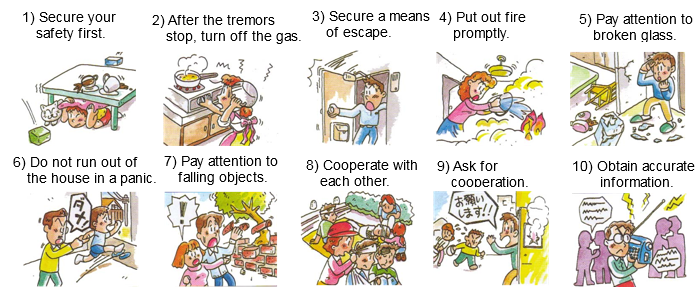
How to prepare for an earthquake
Earthquake-proof your home
Earthquake-proofing your home is effective in reducing the damage caused by earthquakes and is one of the most important preventative measures you can take.
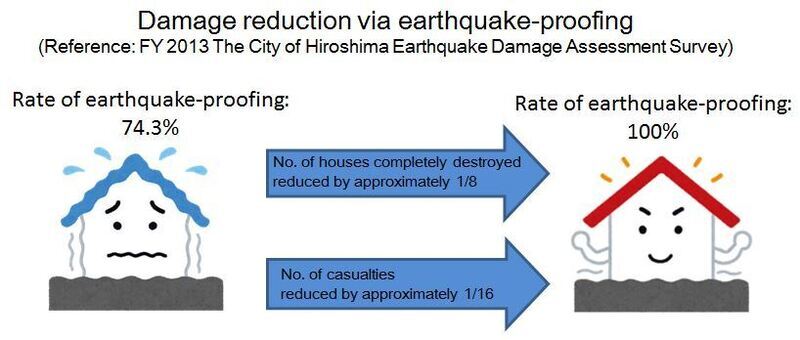
Accordingly, the City of Hiroshima conducts seismic diagnostic surveys on homes and provides grants for earthquake-proof planning and construction work.
Secure and rearrange furniture
It is a good idea to arrange your furniture so that when an earthquake occurs it does not fall and cause you injury or block exits.
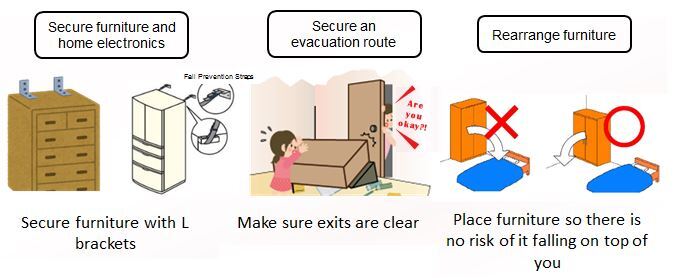
Store essential commodities at home
Essential utilities, such as electricity, gas, and water, may stop functioning due to the impact of an earthquake and you may not be able to get relief supplies immediately.
You are advised to store several days worth of essential commodities at home to see you through until essential utilities are restored or until you can get relief supplies.
Make a family plan
If your house is destroyed by an earthquake, you will need to evacuate to a safe place, such as the home of a relative or an evacuation site designated by the City. Talk with your family in advance and decide on where to evacuate in case you are not all together when an earthquake happens. You should also make sure everyone in you family knows how to work the Dengon Dial (伝言ダイヤル//Dengon Daiyaru) emergency messaging system or other method of contacting one another to confirm you're all safe.
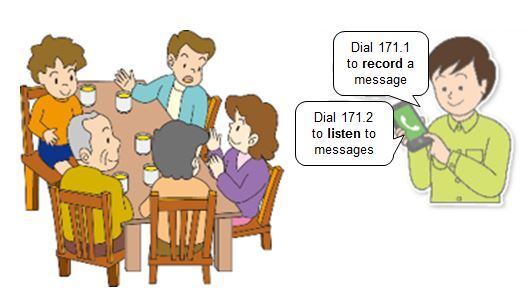
- Fire, Medical Emergencies, and Rescue Services
- Emergency Evacuation Info/Guide App "Hiroshima Emergency Evacuation Guide"
-
List of Designated Emergency Evacuation Shelters(External link)

Evacuation kits
Life in an evacuation shelter is not the most comfortable; it is difficult to ensure personal privacy and there may be supply shortages. Be sure to prepare an emergency kit in advance with everything you and your family will need to evacuate.
Earthquake insurance
The Japanese Government offers earthquake insurance to help people rebuild their lives in the wake of earthquakes.
Inquiries regarding this page
Disaster Prevention Division, Crisis Management Office
1-6-34 Kokutaiji-machi, Naka-ku, Hiroshima
Tel: 082-504-2664 / Fax: 082-504-2802
Mail: [email protected]
PDFファイルをご覧いただくには、「Adobe(R) Reader(R)」が必要です。お持ちでない方はアドビシステムズ社のサイト(新しいウィンドウ)からダウンロード(無料)してください。
